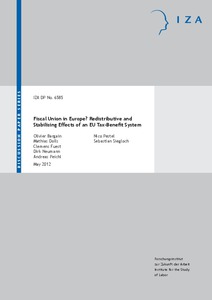Fiscal union in Europe? Redistributive and stabilising effects of an EU tax-benefit system
"The current debt crisis has given rise to a debate about deeper fiscal integration in Europe. The view is widespread that moving towards a 'fiscal union' would have a stabilising effect in the event of macroeconomic shocks. In this paper we study the economic effects of introducing t...
| Main Authors: | , , , , , , |
|---|---|
| Institution: | ETUI-European Trade Union Institute |
| Format: | TEXT |
| Language: | English |
| Published: |
Bonn
2012
IZA |
| Subjects: | |
| Online Access: | https://www.labourline.org/KENTIKA-19134395124919525779-Fiscal-union-in-europe?-Redist.htm |
| _version_ | 1771659892996702210 |
|---|---|
| author | Bargain, Olivier Dolls, Mathias Fuest, Clemens Neumann, Dirk Peichl, Andreas Pestel, Nico Siegloch, Sebastian |
| author_facet | Bargain, Olivier Dolls, Mathias Fuest, Clemens Neumann, Dirk Peichl, Andreas Pestel, Nico Siegloch, Sebastian |
| collection | Library items |
| description | "The current debt crisis has given rise to a debate about deeper fiscal integration in Europe. The view is widespread that moving towards a 'fiscal union' would have a stabilising effect in the event of macroeconomic shocks. In this paper we study the economic effects of introducing two elements of a fiscal union: Firstly, an EU-wide tax and transfer system and secondly, an EU-wide system of fiscal equalisation. Using the European tax-benefit calculator EUROMOD, we exploit representative household microdata from 11 Eurozone countries to simulate these policy reforms and to study their effects on the distribution of income as well as their impact on automatic fiscal stabilisers. We find that replacing one third of the national tax and transfer systems by a European system would lead to significant redistributive effects both within and across countries. These effects depend on income levels and the structures of the existing national tax and transfer systems. The EU system would improve fiscal stabilisation especially in credit constrained countries. It would absorb between 10 and 15 per cent of a macroeconomic income shock. Introducing a fiscal equalisation system based on taxing capacity would redistribute revenues from high to low income countries. The stabilisation properties of this system, however, are ambiguous. This suggests that not all forms of fiscal integration will improve macroeconomic stability in the Eurozone." |
| format | TEXT |
| geographic | EU countries |
| id | 19134395124919525779_d765913dba45457cad346670b5177e3b |
| institution | ETUI-European Trade Union Institute |
| is_hierarchy_id | 19134395124919525779_d765913dba45457cad346670b5177e3b |
| is_hierarchy_title | Fiscal union in Europe? Redistributive and stabilising effects of an EU tax-benefit system |
| language | English |
| physical | 31 p. Digital |
| publishDate | 2012 |
| publisher | Bonn IZA |
| spellingShingle | Bargain, Olivier Dolls, Mathias Fuest, Clemens Neumann, Dirk Peichl, Andreas Pestel, Nico Siegloch, Sebastian European integration fiscal policy income tax statistics taxation Fiscal union in Europe? Redistributive and stabilising effects of an EU tax-benefit system |
| thumbnail | https://www.labourline.org/Image_prev.jpg?Archive=112961393014 |
| title | Fiscal union in Europe? Redistributive and stabilising effects of an EU tax-benefit system |
| topic | European integration fiscal policy income tax statistics taxation |
| url | https://www.labourline.org/KENTIKA-19134395124919525779-Fiscal-union-in-europe?-Redist.htm |

